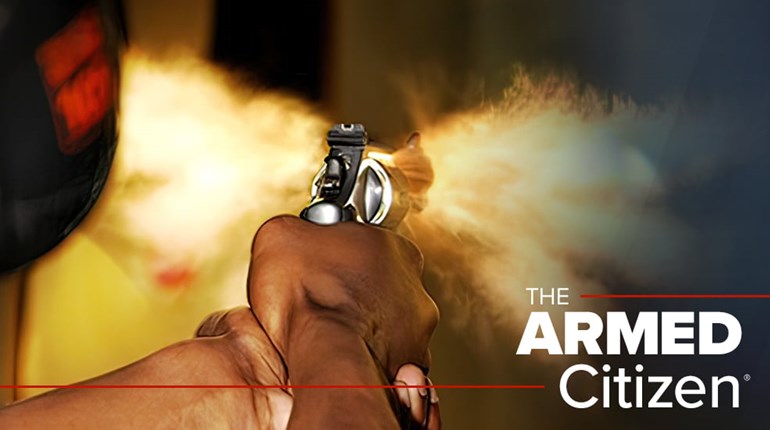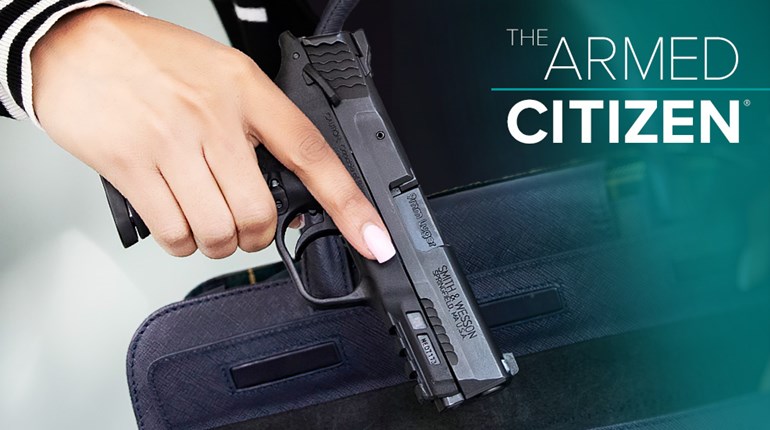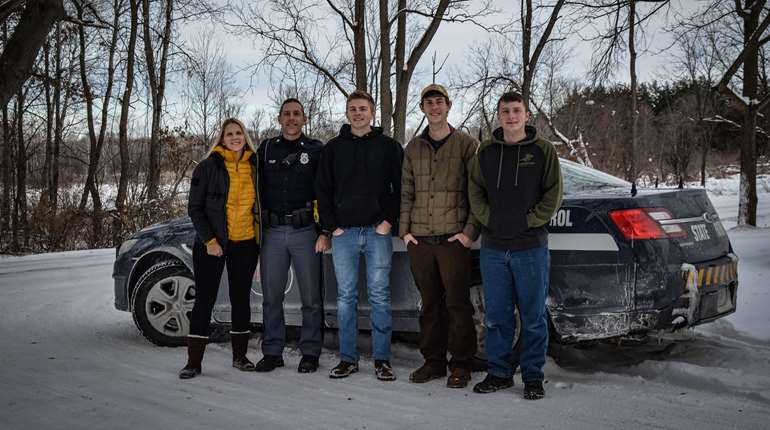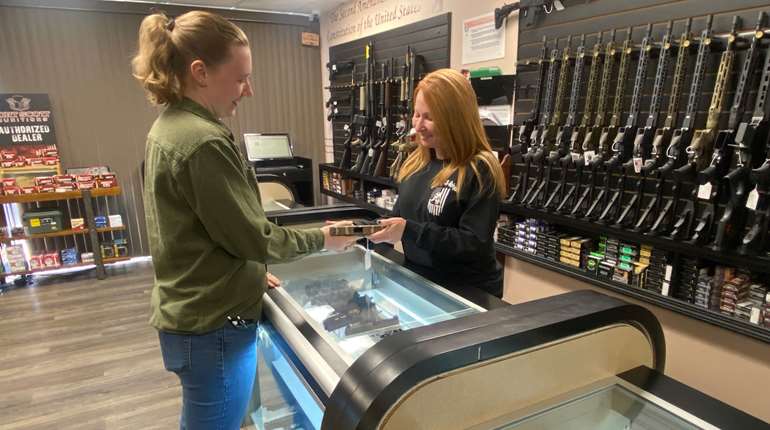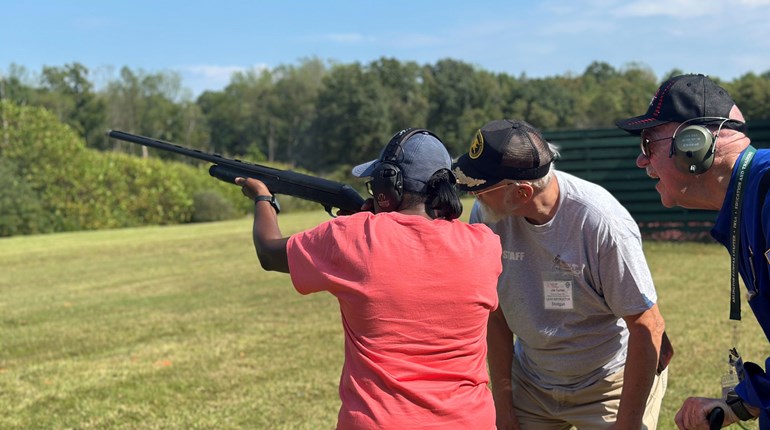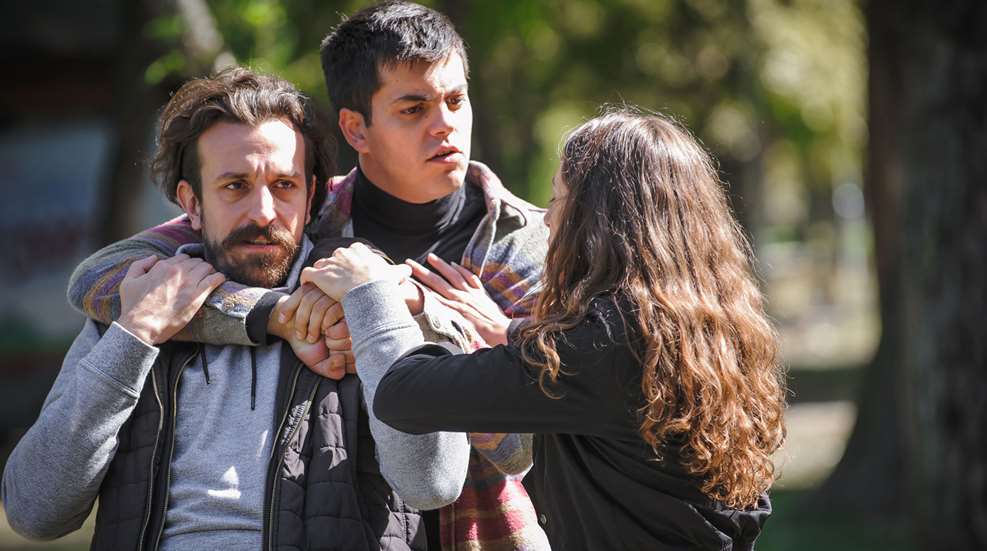
On the second day of an all-women’s handgun training course at Gunsite Academy, we put the firearms away and holstered up with a plastic blue dummy gun to run through a scenario that took place in a simulated doctor’s office waiting room.
It was just me and another “patient” (played by a petite female instructor) in the “waiting room” when her “ex” (played by a much larger male instructor with a booming, intimidating voice) walked in and started harassing her. She was shirking away in fear, trying to avoid him, and he was getting loud and in her face. I was uncomfortable, so I stood up and walked toward the door. “What are you doing? Sit back down! This doesn’t concern you!” he barked at me. Dumbstruck, I stared at him for a second, then squeezed past him through the door and exited the scenario, pulling my phone out when I got outside to simulate calling 911.
I found out afterward that had I stayed, he would have flashed his gun and eventually dragged her out of the office. Out of nine women in the class, I was only one who didn’t draw my “gun” in the victim’s defense. Most of the women “shot” the man in the back while he was removing the woman from the scene (whether or not he had the gun drawn and pointed at her, I’m unclear about, because I bailed before it got to that part).
They all acted like I had done the smart thing, getting out of the situation and avoiding using my gun. But had I? Is the smart thing the right thing? That was years ago and I still think about that simulation regularly. I left a vulnerable woman in the hands of a violent, armed man who apparently intended her harm. Was I scared? Was I selfish? Was it the right thing to do?
The answers? Yes, a little scared. Yes, a little selfish. And … yes, I think it was the right thing for me to do. You might have a totally different answer in the same situation. In the end, I have decided that when it comes to self-defense, my job is to keep my family safe and to get home to them at night—not to save the world. And I realize this isn’t going to be everyone’s choice. Some might even consider it evil or cowardly. But when and if you would get involved in situations that don’t involve you is something you need to sit down and think about.
Now’s the time to contemplate these matters, while your head is cool and you don’t have to make immediate life-or-death decisions. Consider the following:
1. Things aren’t always as they seem.
Hypothetical: You’re in a grocery store parking lot and see a smaller man on the ground, with a much larger man on top of him. They’re grappling and struggling and swiping at each other, and the smaller man is screaming in pain, begging for help. What do you do?
There are a million ways this could play out, and what looks like a victim getting beaten up might in fact be something else. Maybe the larger man is a cop apprehending a suspect. Maybe the smaller man is armed and tried to mug the larger man, who managed to tackle him and is trying to disarm him. Are those situations the most likely? Probably not, but the point is, you don’t know. You don’t know these people or what led up to the events you see unfolding. If you charge into the situation armed and ready to save the day, and it’s not what it looks like (or even if it is what it looks like), things can go sideways on you very quickly.
2. Domestic disputes are notoriously sticky.
Emotions are running high; there’s often alcohol or other substances involved, and the people doing the fighting have usually been down this road before. Many a police officer has responded to a domestic violence call only to have the victim turn around, either at the scene or later in court, and change their story, denying that anything happened and standing up for the suspect.
If you witness a domestic disturbance occurring, bear in mind the first point (things aren’t always as they seem) and also bear in mind that even if the perceived victim really is a victim, she or he might not be grateful to you for getting involved. This situation can turn against you quickly.
3. The legal aftermath can be daunting.
If you’re not a cop, you don’t have the same legal protections as a cop, and either way, the legal aftermath of a self-defense shooting (if the situation goes that far) can take a toll on your life in more ways than one. This might sound like I’m putting a financial price on helping save others’ lives, which isn’t what I’m saying—but if you think you can shoot a man in the doctor’s waiting room (as in our opening scenario) and just walk away as if nothing happened, you’re mistaken.
I always say that the only real way to win a gunfight is to not get in one. Even in the best-case scenario, if a shooting is clearly justified and you are physically unharmed and not charged with anything, as the “winner,” you’ll still experience some losses. There’s an emotional cost to be counted, if nothing else. I’m not saying it’s not worth that cost—but I am saying you should consider it and go in with eyes wide open.
4. The big question: Can you live with yourself?
And this is the crux of the matter—the question that might outweigh everything we’ve just talked about. If you see a dangerous situation unfolding and you don’t intervene, can you live with yourself if an innocent person gets hurt?
Whether or not there are moral implications here depend on your viewpoint and maybe your faith or religion. Is it moral or ethical to see someone in distress and refuse to help them if you have the ability? If so, is there any justification for violating those morals or ethics? These are questions you must answer for yourself. There are no right or wrong answers, and for most of us, there’s no black and white. Just a lot of gray.
Every scenario is different, and you can’t make blanket decisions right now that will always hold up in every situation. Sometimes it truly will be obvious what’s going on. Sometimes there will be so many innocent people involved that someone who normally takes the “not my business” approach will jump into action. What would have happened in that Texas church in 2019 if Jack Wilson hadn’t stepped up and faced an active shooter? And on a smaller scale, if I were a victim of a violent crime in progress, wouldn’t I hope someone would intervene on my behalf? Yes, the world needs those kinds of people.
Most of the women in my Gunsite class who shot the “attacker” gave the same reason: “I wasn’t going to let him walk out with her. What if something happened to her and I didn’t stop it when I had the chance?” Meanwhile, I was thinking, “This poor woman. But this isn’t my business. I’d better get out of here before I’m the one who ends up getting hurt.”
Who was right? I don’t know. None of the choices were free from consequences. I think we all did the thing that was right for us. And with some careful consideration ahead of time, you can make the choices that are right for you.














